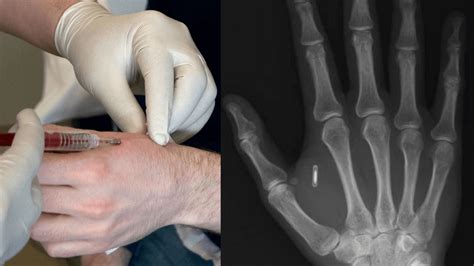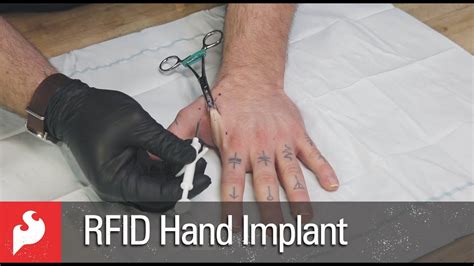are rfid tags dangerous RFID chipsare becoming increasingly popular for tracking people and products, but they can also raise serious privacy concerns. The technology is essentially invisible, allowing for . See more The SocketScan S370 is designed to facilitate mobile wallet applications via on-screen scanning or tap-and-go NFC Reading. It combines the latest 13.56 MHz Near Field Communication (NFC) contactless technology with barcode scanning and Bluetooth LE connectivity. Built for limited counter space and all-day reliability, its compact form factor is .
0 · rfid microchip
1 · rfid hand implant
2 · rfid chip in hand
3 · rfid chip implant
4 · nfc chip in hand
5 · nfc chip implant
6 · human identity chips
7 · biochip implant
Lastly, use an NFC writer app to link the digital business card profile to your NFC card. This step requires extra effort but can provide more control over your digital business cards and networking.

RFID chips, or Radio Frequency Identificationchips, are small electronic devices that use radio waves to store and transmit data wirelessly. These tiny devices have a wide range of applications, from tracking products and assets to providing access control. RFID tagging involves the use of small devices that transfer data . See moreRFID chips can be a great asset, but they also come with a number of potential risks and dangers. Environmental factors are the most commoncause of RFID interference problems. While there are some benefits of using RFID tags for inventory . See moreRFID chipsare becoming increasingly popular for tracking people and products, but they can also raise serious privacy concerns. The technology is essentially invisible, allowing for . See moreRFID technologyhas been increasingly implemented in the healthcare sector, with the aim of improving patient safety and increasing its impact. . See more
RFID chips are a convenient way to store and access data, but they can also be vulnerable to malicious attacks. Hackers can use RFID scanners to steal money from your phone’s tap-to-pay app, or clone the chip and gain access to a system or data. Additionally, . See more

How RFID Tags Could Be Used to Track Unsuspecting People. A privacy activist argues that the devices pose new security risks to those who carry them, often unwittingly. By . Security Risks. RFID chips are a convenient way to store and access data, but they can also be vulnerable to malicious attacks. Hackers can use RFID scanners to steal money from your phone’s tap-to-pay app, or clone the chip and gain access to a system or data.
How RFID Tags Could Be Used to Track Unsuspecting People. A privacy activist argues that the devices pose new security risks to those who carry them, often unwittingly. By Katherine Albrecht. A small chip -- known as an RFID tag -- is attached to or implanted in an object. The tags contain information that can be read at short range via radio waves. The chip and reader don't have to touch. Some RFID tags can be powered by a . RFID stands for radio-frequency identification. A small chip — known as an RFID tag — is attached to or implanted in an object. The tags contain information that can be read at short range via radio waves. The chip and reader don’t have to touch. Some RFID tags can be powered by a battery, but many RFID tags aren’t self-powered. Whilst RFID tags provide a wide basis of opportunity for organisations, it seems that the application of the GDPR cannot be neglected. User consent and transparency becomes crucial when a tag has a unique serial number and can be associated to a consumer.
rfid microchip
To avoid any potential harm to humans, Engels said, UHF RFID interrogators should be set back at least 0.5 meter (1.6 feet) from anyone who might receive constant exposure. He suggests having the read zone cover the body below the neck, which is presumably where the tag would be placed. With regards to COVID-19, components of an RFID system can fail and leave gaps in contact tracing, potentially missing staff who had an exposure. It would be dangerous to assume that RFID works flawlessly and give staff a false sense of security if they are not included in an outbreak notification. AirTag uses Bluetooth and Ultra Wideband technology for tracking. RFID uses radio waves. AirTag offers longer range tracking thanks to Bluetooth (~200 ft) and Apple’s global Find My network. RFID is typically limited to ~20 feet from the reader. AirTag is powered by a CR2032 replaceable battery.
You have absolutely nothing to worry about. These consumer security tags often contain a small radiofrequency (RF) transmitter or a passive system that is activated by a nearby source. They are not hazardous in any way to the consumer. You’d be forgiven if you haven’t heard of radio-frequency identification (RFID), a technology that in the mid-2000s elicited worldwide boycotts from consumer and privacy groups, got tied up in a far-right conspiracy about ObamaCare, and was even feared to be the sign of the Antichrist by some evangelical Christians. Security Risks. RFID chips are a convenient way to store and access data, but they can also be vulnerable to malicious attacks. Hackers can use RFID scanners to steal money from your phone’s tap-to-pay app, or clone the chip and gain access to a system or data. How RFID Tags Could Be Used to Track Unsuspecting People. A privacy activist argues that the devices pose new security risks to those who carry them, often unwittingly. By Katherine Albrecht.
A small chip -- known as an RFID tag -- is attached to or implanted in an object. The tags contain information that can be read at short range via radio waves. The chip and reader don't have to touch. Some RFID tags can be powered by a .
RFID stands for radio-frequency identification. A small chip — known as an RFID tag — is attached to or implanted in an object. The tags contain information that can be read at short range via radio waves. The chip and reader don’t have to touch. Some RFID tags can be powered by a battery, but many RFID tags aren’t self-powered.
Whilst RFID tags provide a wide basis of opportunity for organisations, it seems that the application of the GDPR cannot be neglected. User consent and transparency becomes crucial when a tag has a unique serial number and can be associated to a consumer. To avoid any potential harm to humans, Engels said, UHF RFID interrogators should be set back at least 0.5 meter (1.6 feet) from anyone who might receive constant exposure. He suggests having the read zone cover the body below the neck, which is presumably where the tag would be placed.
thinkpad t450 smart card reader
With regards to COVID-19, components of an RFID system can fail and leave gaps in contact tracing, potentially missing staff who had an exposure. It would be dangerous to assume that RFID works flawlessly and give staff a false sense of security if they are not included in an outbreak notification. AirTag uses Bluetooth and Ultra Wideband technology for tracking. RFID uses radio waves. AirTag offers longer range tracking thanks to Bluetooth (~200 ft) and Apple’s global Find My network. RFID is typically limited to ~20 feet from the reader. AirTag is powered by a CR2032 replaceable battery.You have absolutely nothing to worry about. These consumer security tags often contain a small radiofrequency (RF) transmitter or a passive system that is activated by a nearby source. They are not hazardous in any way to the consumer.
tlv structure smart card
rfid hand implant
rfid chip in hand
The COMPRION Test SIM Simulator is an integral part of the test setup offered by vendors of network test equipment. This new solution enables 100% test automation of network protocol conformance testing. Based on the IT³ Prove! .
are rfid tags dangerous|human identity chips